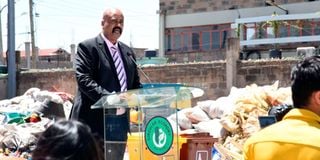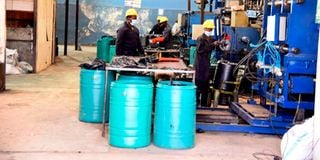
House manager Alice Kavindu explains how Taka Fit, an recycling initiative of Nyayo Estate residents works, to Nairobi Metropolitan Services (NMS) Director General Mohammed Badi (right) and Environment Principal Secretary Dr Chris Kiptoo during a tour of the Vintz Plastics and Nyayo estate on August 23, 2021.
| Diana Ngila | Nation Media GroupNews
Premium
The art of making money from trash
What you need to know:
- Kenya, with a population of more than 45 million people, generates about 23,000 metric tonnes of waste per day.
- The capital Nairobi alone produces about 3, 000 metric tonnes, according to the Nairobi Metropolitan Services.
Twice a week, Alice Kavindu, a 28-year-old domestic manager at Nyayo Estate in Embakasi, Nairobi, takes out three bags of trash.
One bag contains organic waste mainly from food remains, the other plastic, and the third carries general waste.
In the kitchen, two trash bins, blue and purple, stand side by side, and a carton box, waiting to fill up.
Members of the household know where to put which waste, a show of their own small way of conserving the environment.
On the day of disposal, Kavindu sometimes uses two trash bags to dispose of organic waste to avoid spillage.
As a standard procedure, she ties the top hem tightly, carefully carries the bags to the trash house and places each bag correctly, as labelled. She never forgets to lock the door to keep cats out.
Occupants of more than 100 houses within Court 781, where Kavindu lives, do the same. The trash bags are picked up by a garbage truck every Wednesday and Saturday.
Alice’s employer and her neighbours are members of Nyayo Estate Residents Association, who are on a mission to educate other residents on proper waste management.
Within the same sub-county, at Mukuru kwa Njenga slums, a group of youth called Mukuru Community Conversation collects the waste and sells recyclable plastic materials to a recycling firm, Vintz Plastics Limited.
For these two groups, the circular economy of waste management is a model they are used to.

Nairobi Metropolitan Services (NMS) Director General Mohammed Badi during a tour of the Vintz Plastics and Nyayo estate on August 23, 2021.
And now, the Environment ministry has dumped the longest serving linear economy and embraced the idea.
Besides waste management, the model employs reuse, recycling and responsible manufacture — creating jobs and wealth along the value chain.
Environment Principal Secretary Chris Kiptoo says the ministry is on an awareness campaign to popularise the idea.
“The new waste management policy was approved by the Cabinet in February this year. This new policy has done away with dumpsites, which will now become material recovery centres, which derive value out of waste,” says the PS.
The move, he says, is a paradigm shift from the linear model where waste is not segregated at source before being shipped to material recovery centres.
“Once segregation has been done, the result is 60 per cent of organic waste, which is taken to a composting area. The plastics that form 30 per cent are taken to recycling companies, and what cannot be recycled will be taken to a land fill,” explains Kiptoo.
The ministry has come up with extended producer responsibility regulation under Environmental Management Coordination Act to ensure that every company follows up on post-consumer handling of waste generated out of their products.
By law, the companies are supposed to be members of a Producer Responsibility Organisation, and will receive their licences from the National Environmental Management Authority.
Waste segregation
“If you are producing bread, you must follow up on the packaging material to retrieve it in a take-back scheme,” explains Kiptoo.
The PS also notes that the Sustainable Waste Management Bill 2021 proposed by Senate Majority Leader Samuel Poghisio will put new laws into place that will turn around the process of waste management.
“Once the bill is debated and hopefully passed into law, households and organisations will be required to segregate waste before disposal. No one will be allowed to transport unsegregated waste, and it will be illegal to dump garbage in dumpsites,” remarked the PS.
Nairobi Metropolitan Services (NMS) Director-General Mohammed Badi has lamented about the failure of households to segregate waste.
The result, he says, is material that is almost impossible to sort, thereby losing a lot of value in the waste.
In an interview with the Nation, he disclosed that NMS had started construction of material recovery facilities (MRF) in Nairobi’s 17 sub counties.
This will ensure that there are designated waste collection points that allow for secondary segregation, recovery, reuse, up cycling and recycling.
“Some will be public premises such as parks and markets while others will be cited within the local communities. The ones at Muthurwa and Mowlem in Dandora are near completion,” explained the NMS boss.

Vintz Plastics staff at work on August 23, 2021.
In support of the initiative, Badi explained that NMS recently issued contracts to private garbage collectors who are paid for the amount they collect.
He added that NMS also signed a memorandum of understanding with United Nations to clean all Nairobi rivers.
“We are also working with the military and National Youth Service (NYS) to maximise cleaning of Nairobi rivers. Through the Environment ministry and NEMA, we have already started arresting and taking to court those who release effluents into the Rivers,” he said.
“We have also signed a memorandum of understanding with ministry of energy to convert organic waste into energy and other materials such as fertilisers. We do groundbreaking of construction site of the factory at Ruai in September,” added Badi.
Kenya, with a population of more than 45 million people, generates about 23,000 metric tonnes of waste per day. The capital Nairobi alone produces about 3, 000 metric tonnes, according to NMS.
The United Nations Environmental Programme (Unep) views circular economy as a critical way to reduce emission of dangerous greenhouse gases, hence mitigating climate change.
According to Unep’s International Resource Panel, the world could reduce its use of raw materials by up to 99 per cent if products were repaired and refurbished.





